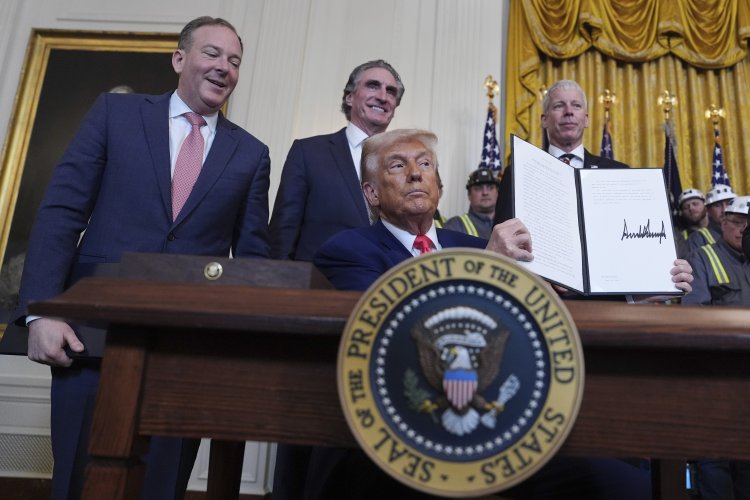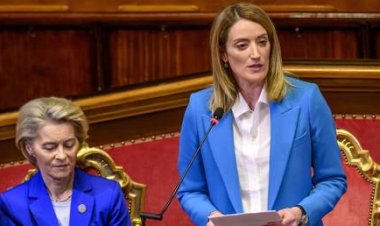Trump's EPA Battles for $20B Worth of 'Gold Bars'
The Biden EPA allocated billions of dollars to promote clean energy technologies in lower-income communities. Now, the Trump administration is working to reverse this initiative.

That program is now facing serious challenges.
A federal judge has until Tuesday to decide if the EPA can continue to freeze the $20 billion in federal funds central to this climate initiative while the courts determine whether the administration has the authority to cancel the grants altogether.
Currently, that money has been sitting idle in accounts at Citibank, where the EPA’s leaders from Biden's administration had placed it for the benefit of eight nonprofits focused on affordable housing and community lending. If these organizations remain blocked from accessing the funds, at least two have indicated they could go bankrupt.
According to an analysis from PMG, the nonprofits have already allocated over $2.6 billion from those funds to projects throughout the U.S. But the majority of that funding is now suspended.
The dispute over the $20 billion has evolved into one of the most contentious areas of President Donald Trump’s efforts to undermine Biden’s climate and energy policy, resulting in legal battles and investigations, including an FBI criminal inquiry. At the core, this conflict revolves around Trump’s authority to retract federal funds that have already been disbursed, contrasted with Biden's goal of using the EPA to transform economically disadvantaged communities.
Democratic lawmakers incorporated this funding into Biden’s 2022 climate legislation, establishing deadlines for the EPA to award, contract, and disburse the $20 billion well ahead of the next presidential term. They anticipated that this infusion of funds would attract approximately $200 billion in private investment to support initiatives such as community solar energy, electric transportation, and efficiency upgrades for rental housing.
However, prior to Trump taking office, agency watchdogs cautioned that the statute’s stringent deadlines and large financial sums, combined with a limited administrative budget, could render it susceptible to waste and misuse.
Those warnings have resurfaced, as Republicans, including EPA Administrator Lee Zeldin, assert — without evidence — that the program is characterized by waste, favoritism, and an attempt to bypass federal oversight. Democrats counter these claims by alleging that Trump’s appointees are violating the law in their efforts to reclaim the funds.
“What's at stake here is that the communities that need clean energy the most — because of the cost savings, because of the jobs, because of the health implications of reducing air pollution — those communities are the ones that have been left out of the clean energy transition that's already well underway,” remarked Andreas Karelas, founder and executive director of RE-volv, a nonprofit contracted with one grant recipient to establish a program to provide solar power to 100 households on tribal lands in Kansas and Nebraska. He added that the EPA program “was going to be a massive injection of capital and momentum to support bringing clean energy equitably everywhere.”
Karelas predicted that his organization has $80 million worth of projects “lined up” across 25 states.
Alison Cassady, who held senior roles at the EPA and the White House during Biden’s term, defended the former administration’s thoroughness in establishing the program and expressed surprise over the Trump-era agency’s efforts to reclaim those resources.
“We did everything we could to do it by the book,” she stated. “They don't care about the book.”
Last year, Republican lawmakers also expressed doubt that Trump could rescind the funding once it had been allocated by the EPA. Senate Environment and Public Works Chair Shelley Moore Capito told PMG weeks after Trump’s election, “Money that's already been obligated and out the door, that's a decision that's final. We’re not gonna go claw back money.”
The $20 billion initiative is part of the Greenhouse Gas Reduction Fund, the largest direct funding source in Biden’s 2022 climate legislation, the Inflation Reduction Act. This program distinguishes itself from the array of tax credits and Energy Department loan guarantees that comprise much of the IRA funding by specifically targeting impoverished communities.
The full greenhouse gas fund — totaling $27 billion — aims to dismantle financial barriers preventing working-class individuals in both urban and rural America from accessing renewable energy technologies and electric transportation. Proponents liken it to the rural electrification initiative of the 1930s, which utilized federal funding to extend power grid access across rural America.
Similar to the Depression-era initiative, the green finance program is designed to leverage federal funds to attract private investment. The Biden administration anticipates that the program would mobilize over $200 billion.
“This really is a transformative investment in ensuring that the clean energy technologies that are going to dominate the 21st century global economy are going to be available to the communities that have been historically left behind on economic investment and opportunity,” said Sam Ricketts, co-founder of the green strategy firm S2 Strategies, who has been advocating for a national green bank since his tenure as an aide to then-Rep. Jay Inslee in the mid-2000s.
The current legal battle centers on a portion of those funds — the $20 billion — allocated for two nonprofit-led programs, which were transferred last year to Citibank, acting as the program’s financial agent under an agreement with the Treasury Department.
Democrats in both Congress and the Biden administration believed they had effectively shielded the program from potential Trump interference.
The IRA, passed with full Democratic backing, allowed the EPA just over two years to devise the program, conduct grant competitions, and award funds. If the agency did not obligate the funds by the end of September 2024, they would expire.
The EPA met this timeline, finalizing contracts weeks before the Sept. 30, 2024, cutoff — and well before Inauguration Day.
“We worked hard, obviously, both at the political and career level to obligate the funding expeditiously,” Cassady explained. “But it was also really important to us to maintain high, rigorous standards for each of the grants. We didn't want to cut corners.”
Some government oversight officials raised concerns last year regarding the program’s atypical structure and the immense amounts of money involved, given the limited resources provided to the EPA for its administration.
Sean O’Donnell, the then-inspector general for the EPA, informed the House Energy and Commerce Committee last year that he was “alarmed” by the complexity of the program, which he likened to the EPA funding an investment bank.
Nicole Murley, the current acting inspector general for the EPA, advised the committee in recent written responses that new programs like the green banking initiative are “inherently more prone to inefficiencies and errors than existing programs,” and she noted that the statute's tight timeline for establishing the program presents “concerns.”
The inspector general’s office has initiated a review of the program.
The program’s fundamental mission — which exists at the intersection of climate action and wealth redistribution — renders it particularly vulnerable to scrutiny. The Trump administration has vowed to eliminate federal policies that impose penalties on the fossil fuels industry or that promote diversity, equity, and inclusion. The fact that this initiative embodies both elements has made it a prime target for the administration's dismantling efforts.
As Trump’s second administration progresses, the program’s status hangs in the balance. The funding for two of its three grant programs remains frozen, and Zeldin has declared them “terminated” — a decision currently under judicial review.
The remaining program — a $7 billion grant initiative intended to provide solar energy to low-income communities, which has garnered some bipartisan support — is currently operational. Most of its recipients are state agencies. However, funds were frozen early in Trump’s term, and several recipients are now under investigation.
Still blocked are a $14 billion national green lending facility and a $6 billion assistance program designed for community lenders financing projects like solar panels and heat pumps.
The eight grantees are now caught in the legal struggle surrounding the EPA’s attempt to reclaim the funding. U.S. District Judge Tanya Chutkan in Washington, an appointee of Barack Obama, is expected to rule soon on whether the nonprofits can access their now-frozen Citibank accounts while litigation continues.
If Chutkan decides against them, the freeze will extend into a third month, and at least two recipients have warned they will be unable to continue operations.
It wasn’t until February 12 that Zeldin started publicly voicing concerns about the $20 billion programs, which had previously evaded Trump’s initial funding freezes because the money was held at Citibank.
Zeldin, a former representative from New York who has shifted from being a member of the House Climate Solutions Caucus to a firm ally of Trump, posted on X that Treasury’s agreement with Citibank should “immediately be terminated” and that the funds should be returned to federal coffers.
“Shockingly, roughly $20 billion of your tax dollars were parked at an outside financial institution by the Biden EPA,” Zeldin remarked. “This scheme was the first of its kind in EPA history, and it was purposely designed to obligate all of the money in a rush job with reduced oversight.”
Zeldin did not provide a specific rationale for his critique of the program. He also did not make any particular allegations against the grantees, a stance he has maintained. However, he referenced a video covertly recorded late last year by the conservative media group Project Veritas, which depicts a Biden EPA adviser comparing the agency’s hurry to disburse climate funds before Trump’s inauguration to “throwing gold bars off the edge” of the Titanic.
Zeldin has cited this video in interviews and congressional sessions to argue that the Biden administration poorly designed the program and awarded the grants ineffectively, though a lawyer representing the former staff member, Brent Efron, clarified that the comments were not directed at the Greenhouse Gas Reduction Fund.
Nevertheless, the term “gold bars” has become a shorthand for the green lending program, frequently appearing even in the agency's legal filings.
A few days following Zeldin's post on X, a federal prosecutor in Washington resigned after alleging that Trump administration officials pressured her to initiate a criminal investigation into the green banking grant recipients despite an absence of evidence for waste, fraud, or abuse. Denise Cheung, the head of the criminal division in the U.S. Attorney’s Office, mentioned in her resignation letter that the Justice Department had also written to Citibank, advising it to freeze the accounts while the investigation continued.
Later, The Washington Post reported that interim U.S. Attorney Ed Martin sought a warrant to seize the accounts, which was denied by a U.S. magistrate judge.
The EPA could potentially recover the funds by issuing a “notice of exclusive control,” obligating it to provide evidence of wrongdoing by the grantees. However, as of Friday, no such notice had been issued.
On February 19, all eight grantees under the two nonprofit programs discovered they were unable to access their funds from the Citibank accounts, and since the EPA’s grant agreements prohibit recipients from drawing down funds for expenses that are more than two weeks in advance, they are projected to exhaust their available grant money by early March.
This situation has created an imminent crisis for two of the program’s largest recipients — Climate United Fund and Power Forward Communities. Both were established as new entities by older nonprofits specifically to pursue the IRA grant funds.
Climate United Fund, which received the largest grant of nearly $7 billion, has begun emergency fundraising and cost-cutting measures.
“We paused all hiring, including a handful of folks who were supposed to, you know, who had start dates, and we have deferred those start dates and we cut salaries of most or all senior staff,” stated CEO Beth Bafford.
Power Forward Communities, awarded $2 billion by the EPA, later informed the court that it was struggling to pay employees and meet basic operational needs. Power Forward has also lost two of its member organizations, Habitat for Humanity and United Way, both of which cited financial necessity.
In March, the reduced staff of the grantees were busy addressing both a summons from the DOJ and a records request from the EPA. The DOJ investigation is reportedly a criminal inquiry, as shared by two sources who requested anonymity due to fears of reprisal. The grantees declined to comment on the investigation, and the office of the U.S. Attorney General for the District of Columbia recently informed PMG’s E&E News that it could “neither confirm nor deny the existence of an investigation.”
Climate United subsequently filed a lawsuit against the EPA and Citibank on March 8, claiming that both had breached their contractual obligations by freezing the funds — and that, in EPA’s case, it disregarded Congress’s intent. The Coalition for Green Capital, awarded $5 billion in grants, and Power Forward Communities also filed similar lawsuits. Their cases have been combined with a lawsuit initiated by Democratic state attorneys general, who argue that the freeze has hindered projects slated for their states.
On the eve of the initial federal court hearing, Zeldin announced a video termination of the grants “based on substantial concerns regarding program integrity, objections to the award process, programmatic fraud, waste and abuse and misalignment with the agency's priorities.”
The disputes have had a tangible effect on the grant recipients.
The Coalition for Green Capital distributed $1.8 billion to 18 subrecipients, expected to close on $888 million in projects by the next reporting cycle. These investments are predicted to secure $2.4 billion from other investors. One of those awards contributed to the creation of the Municipal Investment Fund, intended to offer technical assistance and financial support for clean energy projects in various states.
Saharnaz Mirzazad, Executive Director of the subrecipient managing the fund, ICLEI — Local Governments for Sustainability USA, stated they were reviewing over 100 applicants when the EPA issued its termination letter.
“EPA’s actions not only dissuaded communities from applying to the Municipal Investment Fund, but have now prevented those who applied from accessing funds intended to update our nation’s critical infrastructure,” Mirzazad said in a statement. “As a non-profit, we cannot risk awarding $60 million in grants and our subgrantees incurring costs without certainty we will have access to these funds.”
Zeldin has publicly levied multiple accusations against Biden’s EPA officials who established the fund, alleging “kickbacks,” “theft,” and “graft.”
The core of his assertion suggests that the grantees or their parent organizations are tied to the Biden administration.
For instance, former Georgia gubernatorial candidate Stacey Abrams previously served as senior counsel to Rewiring America, a nonprofit that assisted in launching Power Forward Communities. This connection was raised during Trump’s March address to Congress, but the CEO of Power Forward has stated that Abrams currently has no ties to the organization and “has not received a penny of this EPA grant.”
“I'm proud of my work protecting civil rights & lowering energy costs for Georgians,” Abrams declared on X the evening of Trump’s speech. “Someone has to deliver — because Trump is taking our hard-earned money to cut Elon Musk's taxes.”
Zeldin has also underscored that Jahi Wise, a former senior EPA official who was involved in the banking program’s design during the Biden administration, previously worked for the Coalition for Green Capital.
In a March letter to the EPA’s acting inspector general, acting Deputy Administrator Chad McIntosh claimed that Wise “personally oversaw a $5 billion grant to his previous employer, the Coalition for Green Capital — without recusing himself.”
However, Wise was on paternity leave during the fall of 2023, when the agency was evaluating application submissions. Prior to that, Wise signed a recusal agreement with the EPA’s ethics office barring him from participating in selection processes involving CGC as an applicant.
Zeldin has also asserted that utilizing Citibank as a financial agent limited the EPA’s oversight over the program.
“I’ll tell you what is most frustrating is not having accountability over funding,” Zeldin expressed on Fox News during an interview with host Brian Kilmeade. “To inherit a system where I don’t have eyes on tens of billions of dollars.”
Nonetheless, this arrangement with the bank allowed the EPA to monitor the management of funds, even though it could not seize control of the accounts unless individual grant recipients breached contract terms or committed fraud.
Conversely, grantees and former Biden officials contend that the agreement with Citibank offers the EPA enhanced capabilities to track usage of the funds than if they had remained under Treasury oversight.
Such financial agent arrangements are not uncommon within other federal agencies. For example, Trump’s Treasury Department in 2020 established the Municipal Liquidity Facility to serve as a financial agent for pandemic-related business loans, and also used PJT Partners, an investment bank, to administer relief for airlines during the pandemic.
As the nonprofits await the court's ruling on their funding, Zeldin’s criticisms of the program have begun to permeate Washington.
Lawmakers from the House Energy and Commerce Committee recently launched an investigation into the nonprofits involved.
Chair Brett Guthrie hinted at the inquiry in a February oversight hearing, labeling it “just the beginning” of the committee’s examination of the fund.
However, he reserved his harshest remarks for the EPA, rather than the grant recipients.
“I want to emphasize that we're not insinuating that all applicants and recipients are guilty of wrongdoing; rather, the sheer pace and volume with which this funding was awarded raises questions,” he stated.
Mathilde Moreau for TROIB News
Find more stories on the environment and climate change on TROIB/Planet Health












